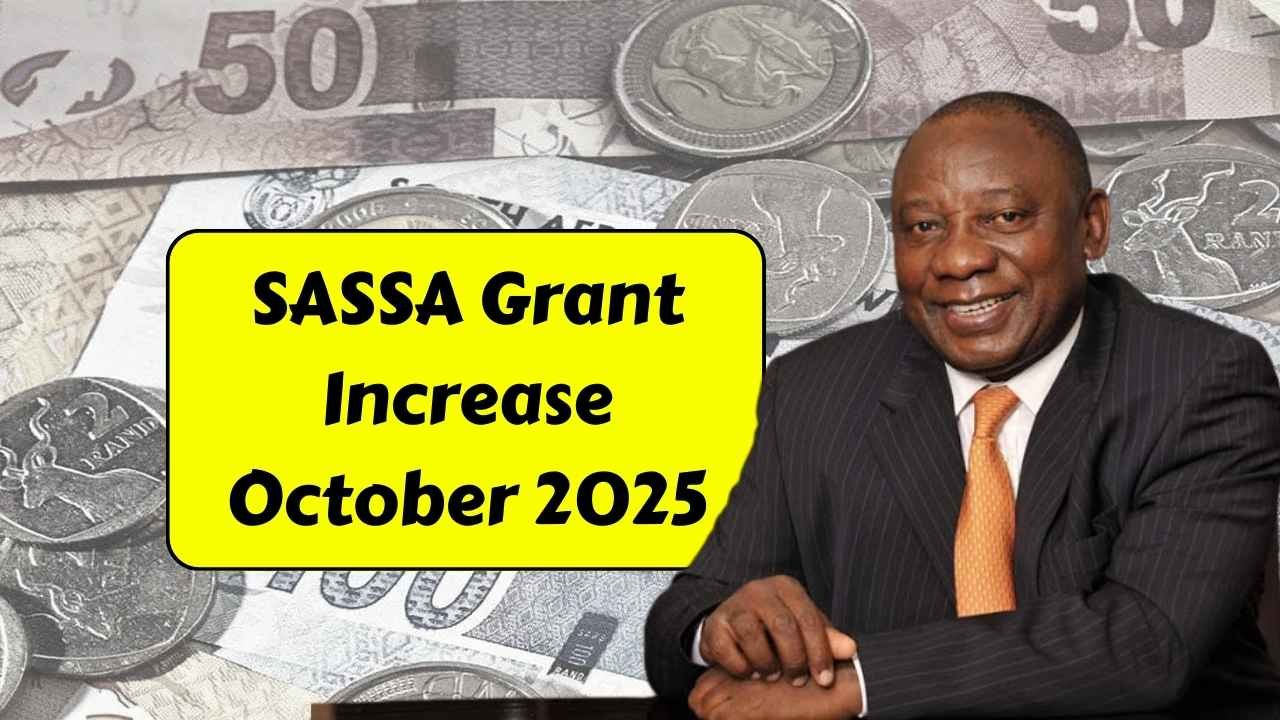Join on WhatsApp
Get the latest updates directly on WhatsApp – motivation, news & more!
Millions of South Africans depend on monthly social grants to meet their most basic needs. With the rising cost of living, the government has recognized the need to adjust these grants to ensure that beneficiaries can still afford essentials like food, electricity, healthcare, and transport. In October 2025, the updated grant amounts and a clear payment schedule provide much-needed certainty for vulnerable households.
Why the October 2025 Increase Matters
This year’s increase is part of the adjustments announced earlier in 2025 and reflects ongoing efforts to cushion citizens against inflation. South Africa has been grappling with higher food prices, energy costs, and other living expenses. For pensioners, people with disabilities, and caregivers, even a modest increase can bring relief. The October cycle is particularly important because it ensures that beneficiaries are supported before the festive season, a time when household expenses typically rise.
Updated Grant Amounts from October 2025
From October onwards, the following grant amounts apply. These increases were introduced earlier in the year but continue into the final quarter of 2025, offering beneficiaries a more stable safety net.
- Old Age Grant (60–74 years): R2,315
- Old Age Grant (75 years and above): R2,335
- Disability Grant: R2,315
- Care Dependency Grant: R2,315
- War Veterans Grant: R2,335
- Foster Care Grant: R1,250
- Child Support Grant: R560
- Grant-in-Aid: R560
- Social Relief of Distress (SRD) Grant: R370
These amounts reflect government’s attempt to strike a balance between fiscal responsibility and social protection. While many argue that the grants still fall short of meeting actual living costs, they remain a lifeline for millions of households.
Full Payment Schedule for October 2025
SASSA has released the official payout schedule for October, giving beneficiaries clear dates for when they can collect or access their funds. Having this schedule in advance reduces uncertainty and helps people plan their monthly spending more effectively.
- Old Age Grant: Thursday, 2 October 2025
- Disability Grant: Friday, 3 October 2025
- All other grants (Child Support, Foster Care, Care Dependency, and Grant-in-Aid): Monday, 6 October 2025
The Social Relief of Distress grant follows a slightly different pattern. Payments are generally processed later in the month after applications and eligibility checks are verified. Beneficiaries are advised to monitor updates from SASSA for exact SRD payment dates.
How the Increases Affect Different Groups
For older persons, the increase means more room in their limited budgets. Many pensioners use their grants to support not just themselves but also younger family members. The small difference between the 60–74 age group and those over 75 acknowledges the higher medical and living costs of older seniors.
People with disabilities and caregivers of children with special needs also see meaningful benefits. These groups face ongoing expenses for medical care, transport, and special support services. The adjusted amounts, while still modest, help cover at least a part of these costs.
For families receiving the Child Support Grant, the increase to R560 per child might appear small, but it contributes to essentials like food, school supplies, and transport to school. In households with multiple children, even small adjustments can add up.
The Role of the SRD Grant
The Social Relief of Distress grant, currently set at R370 per month, has become a cornerstone of temporary financial support for unemployed and struggling South Africans. It was initially introduced during the pandemic and has been extended multiple times due to continued high unemployment and poverty levels.
While there has been ongoing debate about making the SRD grant permanent, for now it continues until at least March 2026. October’s payments will therefore remain an important lifeline for those with no other form of income.
Managing Payments Safely
Beneficiaries are urged not to rush to collection points on the very first day of payment. Funds remain available after the official date, which means there is no need to queue for long hours or risk overcrowding. Those who receive payments directly into bank accounts can withdraw money at ATMs, retailers, or banks at their convenience.
It is also vital for beneficiaries to ensure their contact details and banking information are updated with SASSA. Incorrect or outdated details can lead to unnecessary delays and stress. Keeping personal information secure also helps prevent fraud and unauthorized access to funds.
The Bigger Picture
Social grants remain one of the largest government expenditures, reflecting the country’s high level of inequality and poverty. They play a key role in reducing hunger and providing a safety net, especially in rural areas where employment opportunities are limited.
However, economists caution that the value of grants often fails to keep pace with the actual cost of living. Inflation erodes purchasing power, meaning that even after increases, many households still struggle to cover their needs. This is why civil society groups continue to call for higher adjustments and expanded eligibility.
Looking Ahead
The October 2025 grant schedule reassures millions of South Africans that their support is on the way. Yet the long-term question remains: how can the country balance economic constraints with the growing need for social support? Discussions about basic income support, permanent SRD grants, and broader social protection measures are likely to dominate policy debates in the coming years.
For now, beneficiaries can rely on the updated amounts and plan around the October payment dates. While challenges remain, the grant system continues to provide a critical buffer for those most in need.
Conclusion
The SASSA grant increase and the October 2025 payout schedule represent more than just numbers. For pensioners, parents, people with disabilities, and the unemployed, these payments mean food on the table, transport to school, and medicine in the cupboard. They are a reminder of the state’s responsibility to protect its most vulnerable citizens.
As October begins, beneficiaries should keep track of the official dates, update their information with SASSA, and use the grants wisely to cover essentials. Though the amounts may not solve every financial challenge, they remain an important lifeline and a step toward dignity for millions of South Africans.



If you’re looking for unique artwork that merges realism with a touch of fantasy, I’d love for you to visit my page at https://fansly.com/XArtStudio. I post digital portraits in multiple styles, including Acry-Real and Glamour, with canvas previews showing how the finished product might look. It’s a blend of creativity and detail.
I have applied (SRD)but still I haven’t get a cent.My question is a we not good enough to get that grant
I’m still waiting for my children’s grant for march I haven’t receive it
Excelente post sobre fracturas complejas y recuperación. Para atención especializada en traumatología en la zona
sur de la Ciudad de México, el Dr. Harim Arias es altamente recomendable.
Please STOP with all these promises is elderly people can bare survive, to make us excited about supposed increases is cruel!!!
I am volunteering but find my stipend after three months but sassa take my social relief grant.I want to know why and where is going to whom.
I’m Terence Van Rensburg,was approved but not received any payment 29Aug 2025,I’d.7803315236083
I’m not getting any money now and I’m not working how do I apply because since I dont gett Srd